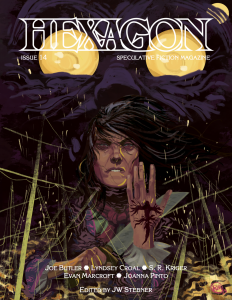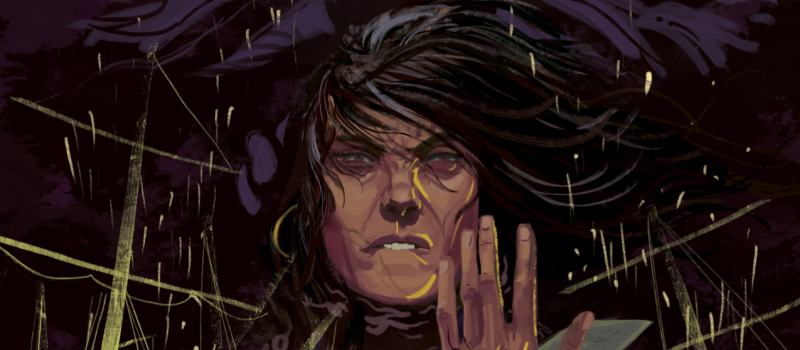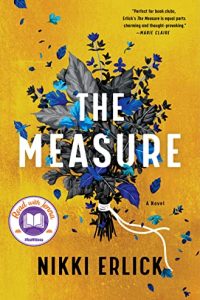Charles Payseur Reviews Short Fiction: Strange Horizons, Hexagon, and GigaNotoSaurus
 Strange Horizons 8/21/23, 8/28/23, 9/4/23, 9/11/23
Strange Horizons 8/21/23, 8/28/23, 9/4/23, 9/11/23
Hexagon Fall ’23
GigaNotoSaurus 7/23
Some wonderful poetry bridges Strange Horizons’ August and September content, starting with “Stoic” by Mukut Borpujari, which confronts simplicity and the philosophical stoicism that focuses on knowledge over possessions – over the physical. The poem follows a divesting of things, the narrator part of a couple who are cleaning house and getting rid of a lot of stuff in their lives. And that paring down is linked to the couple finding more of each other again, reconnecting to their relationship without the obstacles those objects represented and became – or at least attempting to. While the poem doesn’t really show how this process succeeds or fails, the way it frames this process, and where it leaves the couple, is warm and lovely and very much worth checking out. T.C. Mill also provides a fascinating poem with “From Summerland”, which finds people living in a kind of utopia, where the narrator is trying to complicate rather than explain the particulars of this possible paradise. The exact nature of the place isn’t fully revealed – is it a haven for uploaded consciousnesses? – but what is clear is that things are bountiful and good, and want and scarcity are things of the past. The narrator argues, though, that they are things to remember, because without knowledge of how difficult things were, it’s too easy to err in ignorance and lose what has been built. Mill does careful work in the construction of the piece, the stanzas spanned by ideas and rarely, though crucially, coming to a point at times where punctuation and space both force the reader to pause. It’s a beautiful poem.
Moving to prose, and the first story from Strange Horizons in September was “On the Way to Jeju-do” by Michelle Denham, a heartbreaking story of two cousins who have been grown – cloned – to have their minds replaced with the stored copies of the “original” Eunjeong and Seungwan when their bodies reach the age their predecessors were when they died. Living under the expectation of erasure, the two have each other and little else, save for the pull they feel to the place their predecessors died, an island in Korea called Jeju-do, which becomes for them a magical place they are destined to return to. The piece follows the twists of their lives and the advancement of a law that forbids the nonconsensual overwriting of a clone’s memories, though the law does little to make simple the messy landscape of their situations. Denham shows an expert ability to tug at heartstrings before slicing them entirely, providing a story that is full of a terrible and shattering beauty. And it’s a story that pairs well with Rebecca Schneider’s “I’ll Be Your Mirror”, which also deals with personhood, family, and loneliness. In it, Mare is an artificial person designed to help on a planet quarantined by a deadly pathogen. When Mare finally gets into the field, though, they find that the experience is overwhelming and all-encompassing, to the point where they stop taking care of themself. The piece challenges ideas surrounding care and caregiving while weighing in on debates surrounding personhood, labor, and family. Schneider manages a quiet prose that still manages to be profound and moving, Mare’s journey both one of self-discovery and finding themself among the other people in their life, reaching for comfort, connect, and a complexity that defies simple explanations or definitions.
Moving fully into September, the latest Hexagon features a neat bit of dark academic fantasy with Joe Butler’s “The Bodies That We Give to the Water”. In it, Mina’s partner has been joined with the One – a goal their entire academy aspires to, where they become a new person under the influence of a vast alien intelligence. But for all it’s supposed to be a celebration, Mina is mourning, at least until she finds a note from her former lover that there’s more going on than meets the eye, and that there might be a way to save her from her joining. Butler spins a suspenseful and mysterious tale full of secrets, lies, and sneaking around in the academy’s libraries. While the ending leaves things open enough to imagine further adventures in the setting, it also does an admirable job of giving a sense of closure. The worldbuilding is strange and memorable, and it’s a thoroughly enjoyable read.
GigaNotoSaurus is one of many publications facing funding difficulties that is looking to expand readership and financial support as large corporations like Amazon and The Social Media Platform Formerly Known As Twitter have squeezed revenue sources to their breaking points. And for my money, it’s one of the most consistent publications out there, featuring another strong work in September with Antony Paschos’s strange and captivating “Tiger-boy’s Theater of Shattered Truths”. In it, an illusionist tells the story of a young man, Tilum, travelling to a city that was forbidden to him because he happens to share the face of the city’s despotic prince. Tiger-boy is a revolutionary, while Tilum was more a young man caught by the tides of desire and destiny, dashed upon the rocks of corruption and cruelty. How much of Tilum’s story is true, and how much it ties into Tiger-boy and his growing movement, is left for readers to question, but the story resonates with power and longing. It explores the magic of storytelling, and the dangers it can pose to the wicked and powerful. Paschos mixes a surreal, almost dreamlike magic into a story that at turns resembles Alexandre Dumas’s depiction of the Man in the Iron Mask while being wholly original and wonderfully imaginative.
Recommended Stories:
“On the Way to Jeju-do”, Michelle Denham (Strange Horizons 9/23)
“I’ll Be Your Mirror”, Rebecca Schneider (Strange Horizons 9/23)
“Tiger-boy’s Theater of Shattered Truths”, Antony Paschos (GigaNotoSaurus 9/23)
Charles Payseur is an avid reader, writer, and reviewer of speculative fiction. His works have appeared in The Best American Science Fiction and Fantasy, Lightspeed Magazine, and Beneath Ceaseless Skies, among others, and many are included in his debut collection, The Burning Day and Other Strange Stories (Lethe Press 2021). He is the series editor of We’re Here: The Best Queer Speculative Fiction (Neon Hemlock Press) and a multiple-time Hugo and Ignyte Award finalist for his work at Quick Sip Reviews. When not drunkenly discussing Goosebumps, X-Men comic books, and his cats on his Patreon (/quicksipreviews) and Twitter (@ClowderofTwo), he can probably found raising a beer with his husband, Matt, in their home in Eau Claire, Wisconsin.
This review and more like it in the November 2023 issue of Locus.
 While you are here, please take a moment to support Locus with a one-time or recurring donation. We rely on reader donations to keep the magazine and site going, and would like to keep the site paywall free, but WE NEED YOUR FINANCIAL SUPPORT to continue quality coverage of the science fiction and fantasy field.
While you are here, please take a moment to support Locus with a one-time or recurring donation. We rely on reader donations to keep the magazine and site going, and would like to keep the site paywall free, but WE NEED YOUR FINANCIAL SUPPORT to continue quality coverage of the science fiction and fantasy field.
©Locus Magazine. Copyrighted material may not be republished without permission of LSFF.







